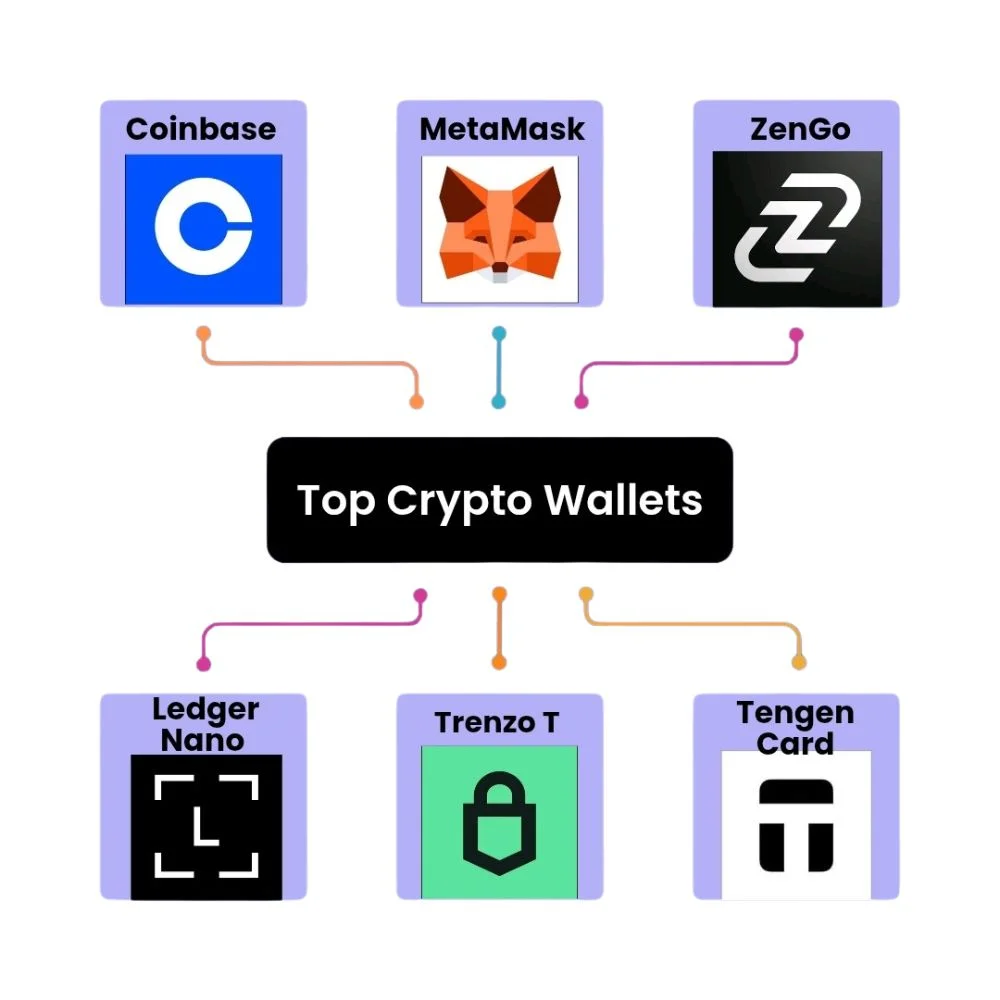Starting your journey with cryptocurrency can feel confusing, especially when you hear terms like private keys, cold storage and hardware wallets. But choosing the right beginner crypto wallets doesn’t have to be difficult. A crypto wallet lets you store, receive and manage digital assets securely. Learning how a crypto wallet functions is crucial for beginners who want to handle digital assets safely. Choosing the right wallet depends on your needs, some are ideal for quick, daily use on mobile devices, while others are designed for safely storing assets long term. With the right setup and a few smart practices, it’s easy to manage funds confidently and stay protected from common risks.
What Is a Crypto Wallet?
A crypto wallet serves as a secure gateway for managing digital currencies, allowing you to access, transfer and keep track of assets like Bitcoin, Ethereum and many other tokens. But instead of holding coins inside it, a wallet keeps your private keys, special codes that prove you own your coins on the blockchain.
Think of it this way:
- Your wallet is like your bank account login.
- Your private keys are your PIN code.
- The blockchain is the ledger where your balance lives.
If someone else gets your private keys, they can spend your money. That’s why protecting them is the most important part of using a wallet.
Hot Wallets vs. Cold Wallets
One of the first choices you’ll make is whether to use a hot wallet or a cold wallet. Each has benefits and limitations:
1. Hot Wallets
- Always connected to the internet
- Easy to set up and use right away
- Great for small, frequent transactions
- Examples: MetaMask, Coinbase Wallet, ZenGo
1. Pros
- Instant access to your crypto
- Free to download
- Works well with decentralized apps and exchanges
2. Cons
- More vulnerable to hacking or phishing
- Not ideal for storing large balances long-term
2. Cold Wallets
- Stay offline most of the time
- Store your private keys on hardware or paper
- Safer from online attacks
- Examples: Ledger Nano, Trezor, Tangem
1. Pros
- Very secure for long-term storage
- Resistant to malware and online scams
- Gives you full control over your keys
2. Cons
- Costs money to buy the device
- Slower to access your funds
Many people choose a combination: a hot wallet for daily use and a cold wallet for saving larger amounts.
Why Beginner Crypto Wallets Are Important?
If you’re new to crypto, using a beginner-friendly crypto wallet helps you learn without risking mistakes. Top wallets designed for newcomer’s place emphasis on:
- Simple setup
- Clear instructions
- Strong security features
- Reliable backup options
It’s also important to pick a wallet that fits your needs. For example, if you want to trade often, you’ll need something with quick access. Anyone planning to store digital currency long-term should consider using a reliable hardware wallet for added protection.
Top Beginner Crypto Wallets You Can Trust
Below are some of the top crypto wallets in 2025 that many beginners love:

1. Coinbase Wallet
This free hot wallet works well with thousands of cryptocurrencies and NFTs. When using this option, you maintain direct ownership of your private keys instead of relying on an exchange to secure them.
Why beginners like it:
- Very easy to install
- Simple design
- Built-in support for decentralized apps
- Free to use
2. MetaMask
A popular hot wallet mainly for Ethereum and ERC-20 tokens. You can install it as a browser extension or use the mobile app.
Highlights:
- Fast token swaps inside the app
- Works with NFT marketplaces
- Simple interface for beginners
3. ZenGo
ZenGo stands out as a hot wallet offering biometric features to verify your identity securely. Facial recognition replaces the usual seed phrase, allowing you to recover your account with biometric verification instead of memorizing a list of words.
Advantages:
- No complicated backups
- Friendly interface
- Great customer support
4. Ledger Nano (Nano S Plus or Nano X)
Ledger hardware wallets are among the safest choices. Your private keys never leave the device.
Key points:
- Supports over 5,000 coins
- Bluetooth option for mobile access (Nano X)
- Strong security chip
5. Trezor Model One and Model T
Trezor is another trusted hardware wallet brand. The Model T includes a touchscreen for easier use.
Benefits:
- Open-source firmware
- Reliable recovery methods
- Supports a wide range of tokens
6. Tangem Card
Tangem offers credit-card-shaped hardware wallets. You tap them with your phone to sign transactions.
Features:
- No battery required
- Simple NFC connection
- Supports thousands of assets
Step-by-Step Instructions for Setting Up a Crypto Wallet
Setting up your wallet properly is essential for safety. Follow this crypto wallet setup guide:
1. For Hot Wallets
- Download the wallet only from the official website or app store.
- Create a strong password that’s unique.
- Write down your recovery phrase on paper (never save it in your email or cloud).
- Confirm the phrase by entering it again in the app.
- Enable any extra security options like PIN codes or two-factor authentication.
- Start with a small transaction to test it.
2. For Cold Wallets
- Purchase the wallet from the official store.
- Take the device out of the box and attach it to your computer or smartphone to begin the setup process.
- Set up a PIN code.
- Write down the 24-word recovery phrase.
- Install the official companion app.
- Test by sending a small amount.
How to Keep Your Crypto Safe
Even the best wallet can’t protect you if you don’t follow good security habits. Here are simple tips to stay safe:
![]()
- Make sure to store your backup phrase somewhere safe and never keep it online.
- Never share your private keys with anyone.
- Use two-factor authentication whenever possible.
- Double-check addresses before you send crypto.
- Keep your apps and firmware updated.
- Consider using a hardware crypto wallet for beginners once you have significant holdings.
Common Questions About Beginner Crypto Wallets
1. What if I lose my recovery phrase?
If you lose your recovery phrase, you may permanently lose access to your funds. That’s why it’s critical to back it up in multiple safe locations.
2. Are crypto wallets free?
Hot wallets are usually free to download. Hardware wallets cost money upfront, but they provide stronger protection.
3. Can I have multiple wallets?
Yes. Many users have both a hot wallet for daily transactions and a cold wallet for storage.
4. Is leaving coins on an exchange safe?
Holding your assets on an exchange platform carries extra risk, since the private keys remain in the company’s control rather than yours. Moving them to your wallet gives you more control.
Conclusion
Choosing the right beginner crypto wallet is the first step toward safely managing your cryptocurrency. Whether you pick a simple hot wallet like Coinbase Wallet or MetaMask or invest in a hardware device like Ledger or Trezor, the most important thing is to understand how your wallet works and keep your recovery information safe.
Start with small amounts, learn the basics and build confidence. With the right wallet and smart habits, you’ll be ready to explore the world of digital assets securely and confidently.



